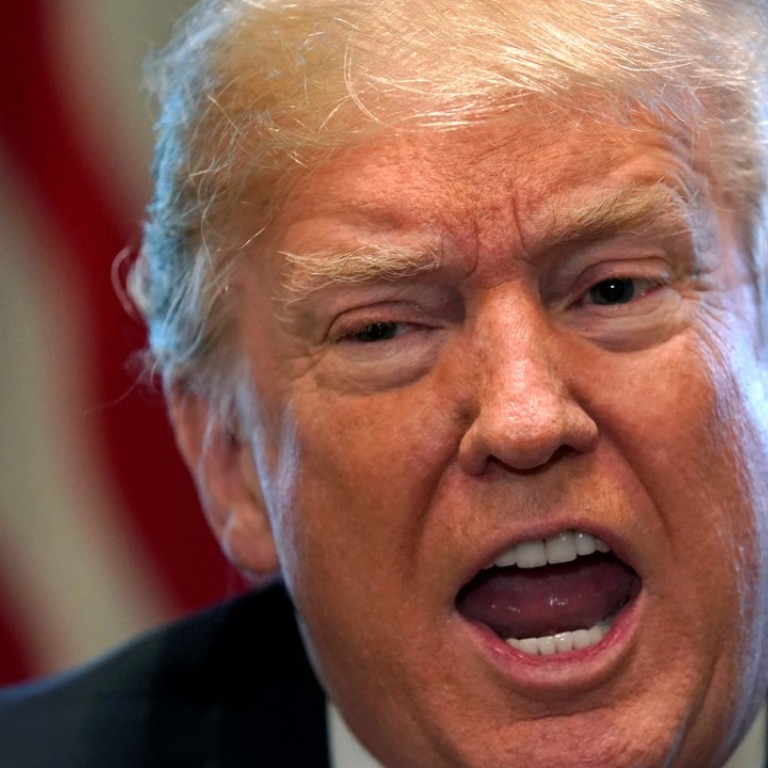
Donald Trump escalates trade war with a tweet, threatens European carmakers with stiff tariffs
Donald Trump’s tweet suggested he is refusing to yield to foreign trading partners alarmed at the prospect of a trade war that rattled financial markets last week
In his expanding war over global trade, US President Donald Trump has aimed his harshest rhetoric at an unlikely target – his country’s closest allies.
In Twitter posts while at his Mar-a-Lago resort in Florida on Saturday, Trump vowed to strike back at European leaders who said they would retaliate for his promised tariffs on aluminium and steel.
Bring it on, Trump warned.
“If the EU wants to further increase their already massive tariffs and barriers on US companies doing business there, we will simply apply a Tax on their Cars which freely pour into the US They make it impossible for our cars (and more) to sell there. Big trade imbalance!” he tweeted.
The country that escaped Trump’s tweeting ire was China, the very nation the president has wanted to hit hardest and the one that is largely responsible for flooding global markets with cheap steel.
“China doesn’t want a trade war with the United States,” Zhang Yesui, spokesman for the National People’s Congress, told a news conference, the eve of the rubber-stamp parliament’s annual session.
“But if the US takes actions that hurt Chinese interests, China will not sit idly by,” Zhang said. An official English-language interpreter added the phrase, “and will take necessary measures”.
On Thursday, Trump said the United States would apply duties of 25 per cent on imported steel and 10 per cent on aluminium to protect domestic producers.
The biggest burden of Trump’s new tariffs would be borne by Canada, the largest trading partner with the United States.
Canada is the largest exporter of steel and aluminium to the United States, supplying US$7.2 billion of aluminium and US$4.3 billion of steel to the United States last year.
Yet in goods and services, the United States runs a trade surplus with Canada, which buys US$48 billion worth of US automobiles and US$40 billion of machinery, in addition to agricultural products.
The steel and aluminium tariffs would also hit the United Kingdom, Germany, South Korea, Turkey and Japan, countries with which the United States has extremely close national security ties.
Major carmakers say the move will hike the cost of cars and trucks.
In January 2017, Trump warned German car companies he would impose a border tax of 35 per cent on vehicles imported to the US market.

To that end, US firms sold US$53 billion in exports and imported US$118 billion in goods from Germany last year, the kind of dynamic that he has often complained about.
German carmakers Volkswagen AG, Daimler AG and BMW AG build vehicles at plants in the United States. BMW employs more than 9,000 workers in South Carolina and is one of the state’s largest employers.
The United States accounts for about 15 per cent of worldwide Mercedes-Benz and BMW brand sales, while it accounts for 5 per cent of VW brand sales and 12 per cent of Audi sales.
The United States had a US$22.3 billion automotive vehicle and parts trade deficit with Germany in 2017 and a US$7 billion deficit with the United Kingdom, according to US government data.
Last year, Germany’s automotive trade association said “the United States would be shooting itself in the foot by imposing tariffs or other trade barriers.”
Trump had tweeted on Friday that trade wars are good and “easy to win,” roiling US financial markets.
Some US allies, like Australia, had hoped to be spared the tariffs. A major South Korean business lobby, the Federation of Korean Industries, said Sunday it sent letters to US Congress members and officials seeking an exemption.
A US official said Friday possible exemptions to the measures would be considered on a case-by-case basis.
Australia warned that a trade conflict could put the brakes on global economic growth.
“That’s what concerns me, if we continue to see an escalation of rhetoric and, ultimately, action around tariffs applying for imports and exports across multiple economies... this will lead to a slowdown in growth,” trade minister Steve Ciobo told Sky News Australia.
On Friday European Commission chief Jean-Claude Juncker said the EU was drawing up measures against leading US brands such as Levi’s and Harley-Davidson.
The Washington Post, Reuters, Agence France-Presse
